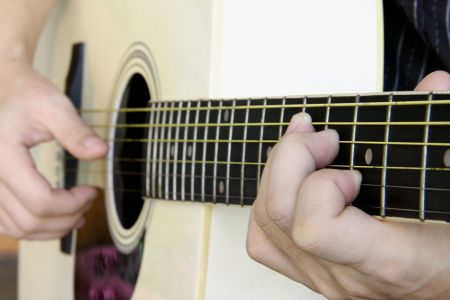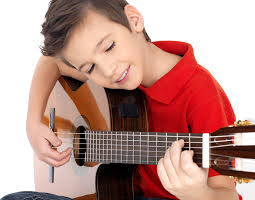Sydney Guitar Lessons
Are you a parent looking for some help in deciding how to select a guitar teacher for your child?
This page is intended to provide you with my personal opinion of what kind of issues are important in making your selection. It is important to recognise at the outset of your search that there is no one answer for all pupils. A teacher in the arts is a very personal process and whereas one particular teacher may be perfect for your child’s friend, they may not be the ideal teacher for your child.
Against this background, here are some of the most important criteria that I consider relevant for your selection. I hope they help you gain clarity.
Identify the type of personality that works well with your child: one that will inspire and motivate
In my opinion, the first and most important aspect to consider is that the study of any art form is a very personal journey requiring the integration of the technical skills required with the deepest feelings of the human soul.
For this reason, my personal opinion is that the teacher of an art form becomes much more than a mere instructor; they become a ‘beacon’, a source of wisdom, a mentor and a role model that has enormous influence over the pupil.
 Based on this statement, the teacher’s personal viewpoint of the subject will influence every aspect of how they approach, teach, guide, interpret, mentor and structure the study process of the study of the instrument for your child. It will determine how flexible, adaptable and empathic they are to their approach and the lessons.
Based on this statement, the teacher’s personal viewpoint of the subject will influence every aspect of how they approach, teach, guide, interpret, mentor and structure the study process of the study of the instrument for your child. It will determine how flexible, adaptable and empathic they are to their approach and the lessons.
It is therefore important to identify a teacher who is passionate and enthusiastic about what they are teaching and capable of inspiring, motivating and encouraging your child. A good sense of humour coupled with patience and empathy are essential in teaching a musical instrument. So it will pay huge dividends in the longer term to ensure that the influence that your child will be subjected to is the right one for their personality and sense of self worth.
Select a guitar teacher with recognised qualifications, rigorous training, a current ‘working with children’ check & who is registered with a recognised music teaching association
Based on my own past experience, I consider it is very important to engage a qualified / credentialed teacher who has been through a rigorous training in all aspects of their topic. This ensures that the teacher has met the required standard in the practical performing aspects, theory, harmony and counterpoint, history of music and therefore has a good knowledge of the subject. While qualifications are not the only yardstick to measure the ability to teach, they certainly offer a good measure with which you can begin your search.
How does the teacher motivate their students? What strategies do they use?
In my opinion, attending a weekly lesson is insufficient to sustain the passion and interest in the topic. Teachers who understand this generally extend themselves to provide other activities to grow the students interest. This might include occasional performance opportunities, duets with other music students, participating in music festivals, encouraging entry into an examination and providing general updates and information about impending concerts etc.
What musical genres (styles) does the guitar teacher offer?
It is important to understand whether the teacher will utilise music other than classical repertoire to train your child. A marriage of interests in music styles and methods is important for a good match that will bear fruit as the lessons progress and the student becomes more proficient.
 So for example, it may be the teacher’s preference to utilise the classics to begin the student’s musical training however, once the fundamentals are secure, what other styles / genres could be introduced within that specific framework? Would the teacher consider introducing some lighter music such as themes from movies or perhaps latin american pieces or lighter jazz?
So for example, it may be the teacher’s preference to utilise the classics to begin the student’s musical training however, once the fundamentals are secure, what other styles / genres could be introduced within that specific framework? Would the teacher consider introducing some lighter music such as themes from movies or perhaps latin american pieces or lighter jazz?
This may not only be important to maintain interest and enthusiasm, it may also be important to developing a well-rounded appreciation of the music repertoire of the world. It can also offer excitement when the pupil ‘travels’ to another country and experiences the flavour of Spain or Italy or Venezuela.
What is the teacher’s policy regarding fees, cancellations, and make-up lessons?
Every teacher embraces policies that work best for their studio and it is very important to understand their approach to these aspects of the process before undertaking lessons. Ensuring clarity right from the start provides certainty over the process and avoids confusion later that may interfere with the enjoyment of the lessons.
Drawing on my personal experience as a teacher I have to comment that I have encountered parents who constantly attempt to manipulate the teacher’s terms and conditions for lessons. This can be distressing for the teacher and if this form of behaviour persists, it can place the relationship under immense stress and act to the detriment of the relationship and teacher’s commitment.
It is therefore imperative to establish whether you are comfortable with the teacher’s terms and conditions from the beginning. Discuss any areas that may produce tension before undertaking the lessons.
What is a reasonable fee for guitar lessons?
It is important to realise that a music education is an investment in your self-development, growth, and happiness and will endure for your lifetime (if you want it to). So my personal advice to parents is simple: purchase the best lessons you can afford for your child – accept nothing less! As an initial yardstick, the Music Teachers Association of NSW currently regards the minimum fee that private music teachers should charge to be approximately $115 (excluding GST) per hour for individual lessons.
How much practice time does the teacher require each day?
 This is really a double edged sword as it depends on the level of the student, their goals and ambitions as well as any impending challenges such as examinations, performances etc. However, most dedicated teachers will seek a commitment of at least half an hour per day in the initial stages, extending to longer periods of practice as the student’s level increases. Of course, for young children, 30 minutes may be longer than is required in the initial stages: each teacher will have their preference and accordingly work with the parent to set an appropriate time limit.
This is really a double edged sword as it depends on the level of the student, their goals and ambitions as well as any impending challenges such as examinations, performances etc. However, most dedicated teachers will seek a commitment of at least half an hour per day in the initial stages, extending to longer periods of practice as the student’s level increases. Of course, for young children, 30 minutes may be longer than is required in the initial stages: each teacher will have their preference and accordingly work with the parent to set an appropriate time limit.
One comment I would like to add for parents (and potential pupils) is that my personal approach is as follows: the general rule of thumb is the regularity of practice and not necessarily the length of time. Regularity of practice is the most important aspect in maintaining a consistent path of improvement.
So for example, if the pupil is under stress at school due to impending exams, daily practice can be divided into two fifteen minute sessions or perhaps, ten minutes before leaving for school and then a twenty minute session later in the day. The point is that the flexibility will help the pupil through such tough times and allow them to maintain progress. In fact, in times of academic stress, it may very well act to relax and offer the student an activity away from their pressured studies.
How can I help my child’s progress?
This is a really critically important aspect of your child’s musical development and one which is not well understood.
I think it is obviously self evident to most parents that the child should be supported with the basics such as the supply of an appropriate instrument, the required books and other required accessories (metronome, strings etc.), a good environment to practice regularly as well as ensure that fees are paid as required.
However, there is an equally important aspect to ensuring your child’s progress and that has to do with positive encouragement, empathy, support and the loving involvement in the process. Please follow the link to continue reading this important section.
